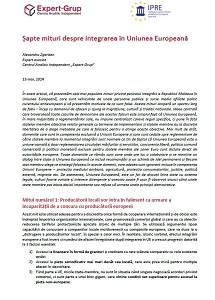Șapte mituri despre integrarea în Uniunea Europeană
Seven myths about integration into the European Union
Author(s): Alexandru Zgardan
Subject(s): National Economy, International relations/trade, EU-Approach / EU-Accession / EU-Development
Published by: EXPERT-GRUP Centrul Analitic Independent
Summary/Abstract: In this article, we present the most popular myths regarding the danger of Moldova's integration into the European Union, which are circulated by some public figures and media sources politically affiliated with the anti-European trend, and we present the reasons why they are false. These myths cover a wide spectrum of phobias – starting with the business field and ending with migration, culture and national traditions. The central idea that runs through all cases of dismantling these fakes is the simple fact that the European Union, in the vast majority of its regulations, does not centrally impose any specific rules, but rather sets before the member states relatively general objectives with implementation deadlines and the member states have discretion the freedom to choose the methods they use to achieve these goals. Moreover, the areas that are in the exclusive competence of the European Union and that are ceded for regulation by the member states at the time of integration are the rules related to the fact that the European Union is a customs union and only the regulation of the movement of goods and services, free competition, the common commercial policy and the monetary policy exclusively for the member states of the Eurozone are dictated directly by the European authorities. All the areas that remain are areas where a collaboration takes place and a dialogue is maintained between the states and the European Union, which includes recommendations and a permanent exchange of ideas, and each member state chooses what strategies they use in these areas, which are often ignorantly included in the competence of the Union European – environmental protection, agriculture, consumer protection, justice, foreign policy, migration, etc. Also, the European Union is a forum for discussions between states with legal systems, very varied cultures and divergent interests, and this can be easily observed when some member states can block important decisions or refuse to follow some democratic principles.
Series: MISCELLANEA - Expert Group, Chişinau
- Page Count: 9
- Publication Year: 2024
- Language: Romanian
- Content File-PDF

